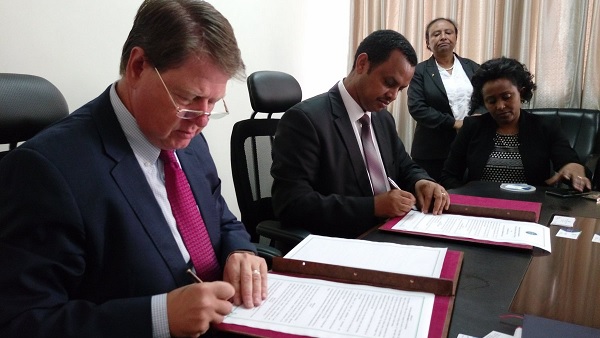
ADDIS ABABA (Semonegna)– TradeMark East Africa (TMEA) is set to expand its presence its in the horn of Africa by opening an office in Addis Ababa, Ethiopia, state media Ethiopian News Agency reports.
State Minister of Foreign Affairs, Afework Kassu, PhD, and Chief Executive Officer of TradeMark East Africa (TMEA) Frank Matsaer signed a Host Country Agreement on August 23, 2018. Ethiopia’s State Minister of Transport, Hiwot Mosisa Deressa, also joined the signing ceremony.
Ethiopia is now TradeMark East Africa’s 8th country of operation by signing the Host Country Agreement, after Burundi, the Democratic Republic of the Congo, Kenya, Rwanda, South Sudan, Tanzania and Uganda.
During the signing ceremony, Prof. Afework said Ethiopia is in the middle of socio-economic reforms, which demand regional economic integration, saying that “infrastructural connectivity is vital in this regard.”
He also lauded the decision of TMEA officials to open office in Ethiopia, affirmed that his government would extend support to such effect.
TMEA CEO, Frank Matsaer on his part appreciated the support of Ethiopian government for the organization to thrive in East Africa.
The potential for Africa to trade with itself is massive, he said and adding that “TMEA his organization would work to speed up the movement of goods and to reduce the cost of trade in East Africa.”
About TradeMark East Africa
TradeMark East Africa – TMEA is an East African not-for-profit Company Limited by Guarantee established in 2010 to support the growth of trade – both regional and international – in East Africa. TMEA is focused on ensuring gains from trade result in tangible gains for East Africans.
Headquartered in Nairobi, Kenya, and funded by a range of development agencies, TMEA works to help the rapid advance of integration, trade and competitiveness of the East African Community member countries. TMEA works closely with East African Community (EAC) institutions, national governments, the private sector and civil society organizations to increase trade by unlocking economic potential through: (1) increased physical access to markets, (2) enhanced trade environment, and (3) improved business competitiveness.
